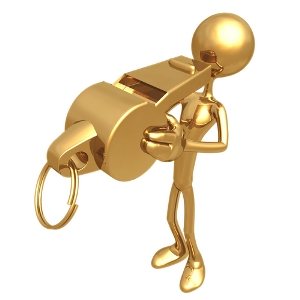
In the news lately, in several fields of life, has been the courage of ‘whistle-blowers’. People who usually at great cost to themselves, say ‘no more’ to denial and are willing to come forward about injustice, personal or corporate wrongdoing. They ‘blow a whistle’ to say stop, no more, this can’t go on anymore. What kinds of courage does it take to do this? To not just go with the status-quo, to say no to being popular or favored by those at the top? Yet almost all family, organizational, national or international change can only begin with someone that says ‘enough’, someone brave enough to challenge the patterns of dysfunction and numbing paralysis of institutional conformity.
For these ‘whistle-blowers’ among us, and for perhaps all of us, arguably the greatest barrier to taking action is a misunderstood sense of loyalty. Somehow we think that if we are truly loyal, we would never take action against a leader or organization even if they are in the wrong. Loyalty has become something different than it should be, it has become a blind loyalty. This kind of loyalty leads not to a culture of honoring and respect, but to a culture of denial. A culture where everyone lives on the hype of success, even when it is not real. Where the persuasion of more numbers and performance veils the very real problems underneath that need to be exposed and addressed redemptively.
When I was in Oxford last week, I went into a store to buy a notebook. As I walked down the aisle, a mother began to sing loudly to her child the old song, ‘Humpty Dumpty’. Most of you would remember the song or the rhyme, or maybe the visuals from a childhood book. ‘Humpty Dumpty sat on a wall, Humpty Dumpty had a great fall. All the King’s horses, and all the King’s men, couldn’t put Humpty Dumpty together again.’ Speaking. truth to power means that Humpty Dumpty would have at least heard from someone the true state of his life or church or movement or nation. Not the power projection of what he hopes to be true, but what is actually true. Without those truth-tellers around a person, the fall, when it comes, will result in a collapse that means a thousand separate pieces.
The times when I hear a leader, whether in a church or any other field of life, say how much they demand or value loyalty, I get very worried. Loyalty is not something as a leader that we should covet or even notice. It will come naturally from followers or team members as they observe a life well lived, however imperfect it may be. The more we demand it, the more loyalty becomes lip-service, given outwardly but the inner heart being in a very different place. Blind loyalty and denial are two sides of the same coin. If we are proclaiming one truth, and living another, denial and a misguided sense of loyalty is sure to be lurking nearby.
Recently a survey came out, on the top several reasons why so many are leaving the institutional church in the US. Yes, I know there are many surveys and many reasons. This is an endless discussion. But one reason does usually appear at the top of most of these surveys. Guess what it is? The lack of authenticity and connection between what Christians say and what Christians do. There can be many reasons for this hypocrisy. But some of it involves a wrong sense of what loyalty is, a mis-placed loyalty that leads to denying our problems, whether personally, in our churches, or in our nations.
The reason whistle-blowing becomes so agonizing, so traumatic, is that there were many steps along the way that something could have been said much earlier. Have you ever seen a situation that has become really, really bad, and wondered, ‘if only this could have been addressed many years before?’ By the time someone blows a whistle to say stop, there have perhaps been a hundred other missed chances. But it is not just because a leader or organization doesn’t want to hear it. It is because a culture of denial has grown over many years sometimes. There is just too much at stake negatively for people to say anything. It is only when someone says, ‘I have nothing to lose anymore’, that finally things comes out and denial shrivels in the light of a new sunrise.
Loyalty is not a bad thing. But it must always be carefully balanced with a love for truth, a love for accountability, a love for servanthood. Loyalty when left alone is a rigid taskmaster, a harsh requirement that often is a one-way street leading to the leader and organization elevated to a place of unrealistic expectations. Speaking truth to power is never easy, and it never has been. It can get you killed in many contexts. But isn’t it worth it?
I honor today the ‘whistle-blowers’ of history, and today, that have faced great sacrifice but have been on the forefront of societal change. And actually, in the end, they were the most truly ‘loyal’ of all.
thanks, Steve. A well-written and very needed message!
LikeLike
Amen!
LikeLike
[…] Some of us think that we can live in denial of problems in our families, nations, or organisations and not face a cost. Wrong. Others of us think that speaking truth to power, or being “whistle-blowers”, will also be able to be done cost-free. Also wrong. Of course of the two, the latter most often is much harder and the cost is much more visible and sometimes immediate. But both have costs. Last week, I wrote a post honoring the courage of people that are willing to not live in denial, out of a wrong understanding of loyalty, and “blow a whistle to say STOP.” (See The Deadly Danger of Loyalty that Leads to Denial). […]
LikeLike